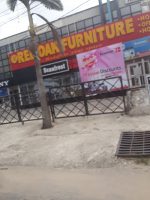There appears to be security collapse in several parts of Lagos, Ogun and Oyo states in this period of coronavirus lockdown imposed by the federal government. Armed robbery and house raids have been on the rise in those areas since the restriction of movement order by the governments from the state to the federal. This is also followed by the failure of governments to provide palliatives to support the citizens who have been kept away from their means of livelihood in all its ramifications, workers stay away from office, traders stay away from shops, artisans also stay away from workshop. Hunger has accelerated in the land, then, maladjustments had followed, erupting into armed robbery which had declined in recent times. These are clear signs that the lockdown is becoming counter-productive as a result of the government having abandoned the people and their welfare.
 Different gangs of youths now raid homes to rob people; break shops to steal food items which include rice, beans, garri, oil, etc., probably for survival. Robbery activities has been rampant in the outskirt of Lagos metropolis, border communities between Lagos and Ogun states, including tarts of the Oyo State capital, Ibadan. Ironically, the Police are not there to intervene in either effecting arrest of the criminals or repel them. The people were left helpless, many crying out loud on social media platforms while the robbery operations are going on in their residents or neighbourhood.
Different gangs of youths now raid homes to rob people; break shops to steal food items which include rice, beans, garri, oil, etc., probably for survival. Robbery activities has been rampant in the outskirt of Lagos metropolis, border communities between Lagos and Ogun states, including tarts of the Oyo State capital, Ibadan. Ironically, the Police are not there to intervene in either effecting arrest of the criminals or repel them. The people were left helpless, many crying out loud on social media platforms while the robbery operations are going on in their residents or neighbourhood.
Places like Ijoko, Sanjo, Otta in Ogun State have known no peace in recent times. Residents have begun to acquire arms to defend their homes in the failure of protection from the government.
Several communities in Ifako/Ijaye LCDA now live in palpable of fear of robbery gangs invading their homes. Places like Ishaga, Obawole- encroaching the suburb of Ogba -then Fagba moving inward, are becoming safe for gang robbery. Residents seldom receive responses on emergency telephone calls.
The coronavirus lockdown is taking its toll on citizens in bitter ways. Life is becoming more insecure; except governments stand up to their responsibilities of protecting lives and property, the Nigerian government may be descending into another era of criminal violence after communities had responded to pressures of acquiring weapons for self-defence. Demobilization and mopping up of such weapons after elections have always been difficult while the country is perennially thrown into violent crimes.
Meanwhile, shops are still closed, roads deserted, and offices shut down except those working from home. Markets engage in skeletal activities while Churches and Mosques are still shut down. Lamentations everywhere and misfortunes increase.
It is nightmare in the urban periphery. Border communities in Ogun State on the Lagos State axis are being terrorized by the bandit without Police intervention. But the people are rising to the challenge.
A victim had narrated: “I just smuggled my way out of the hell-hole, that is, Ifo/Ado Odo-Ota axis of Ogun State now. It is a complete mess. Clearly, the Police are overwhelmed. From Ijaiye through Tollgate, Dalemo, Sango, Ijoko/Ogba-Ayo, Gasline, Ota, Agbado Crossing, Joju, Oniyale, Iyana-Ilogbo, all the way to Ifo, tension is high among folks in those communities…
 “The bad boys are ransacking homes in broad daylight, carting away money and foodstuff.”
“The bad boys are ransacking homes in broad daylight, carting away money and foodstuff.”
The robbery gangs operate repeatedly in Ijoko at night, stealing money and anything edible they could find.
Members of the community now organize to resist the gang robbers in the past five days, keeping vigil with bonfires on the streets. Unfortunately, about two people were said to have died in one community in Ijoko and buried in the storm of the crisis.
A man in Joju narrated how the gang robbers invaded their homes at about noon Thursday – “Some hungry boys with tiny necks came wielding POS machine, baying for blood and money and Semovita.”
Several residents disclosed that operations of the gang robbers have become so rampant that the Police no longer respond to SOS messages, the Police appear to be overwhelmed.
It was observed that that part of the state is traditionally hideout of retired criminals and promising urchins, many of whom were chased away by the Task Force on Environment from the ghettos in Lagos. It was further narrated that at least 60 per cent residents live in abject poverty in those communities. An aged woman, a pepper seller, was said to have had virtually all her capital stolen by the gang robbers on Wednesday. It was decried that “her poverty has found a new nomenclature, defying simple social categorization.” It also lamented that “in this clime, it is expensive to be poor.”
In several communities, young men were identified gathering without health caution to establish their own communal security architecture to confront the gang robbers in the absence of the state security apparatus. This is being done without consideration for social distancing or being mindful of coronavirus infection. It was highlighted that they have no regard for a virus they cannot “see” at the risk of setting up vigilante groups against the gang robbers threatening their lives that they can see and encounter.
In algos, gang robbers operated at Obawole and other suburb of the state Friday night.

 Health1 week ago
Health1 week ago
 Business1 week ago
Business1 week ago
 Health7 days ago
Health7 days ago
 Latest1 week ago
Latest1 week ago
 Latest1 week ago
Latest1 week ago
 Football7 days ago
Football7 days ago
 Education5 days ago
Education5 days ago
 Crime7 days ago
Crime7 days ago

 Different gangs of youths now raid homes to rob people; break shops to steal food items which include rice, beans, garri, oil, etc., probably for survival. Robbery activities has been rampant in the outskirt of Lagos metropolis, border communities between Lagos and Ogun states, including tarts of the Oyo State capital, Ibadan. Ironically, the Police are not there to intervene in either effecting arrest of the criminals or repel them. The people were left helpless, many crying out loud on social media platforms while the robbery operations are going on in their residents or neighbourhood.
Different gangs of youths now raid homes to rob people; break shops to steal food items which include rice, beans, garri, oil, etc., probably for survival. Robbery activities has been rampant in the outskirt of Lagos metropolis, border communities between Lagos and Ogun states, including tarts of the Oyo State capital, Ibadan. Ironically, the Police are not there to intervene in either effecting arrest of the criminals or repel them. The people were left helpless, many crying out loud on social media platforms while the robbery operations are going on in their residents or neighbourhood.
 “The bad boys are ransacking homes in broad daylight, carting away money and foodstuff.”
“The bad boys are ransacking homes in broad daylight, carting away money and foodstuff.”